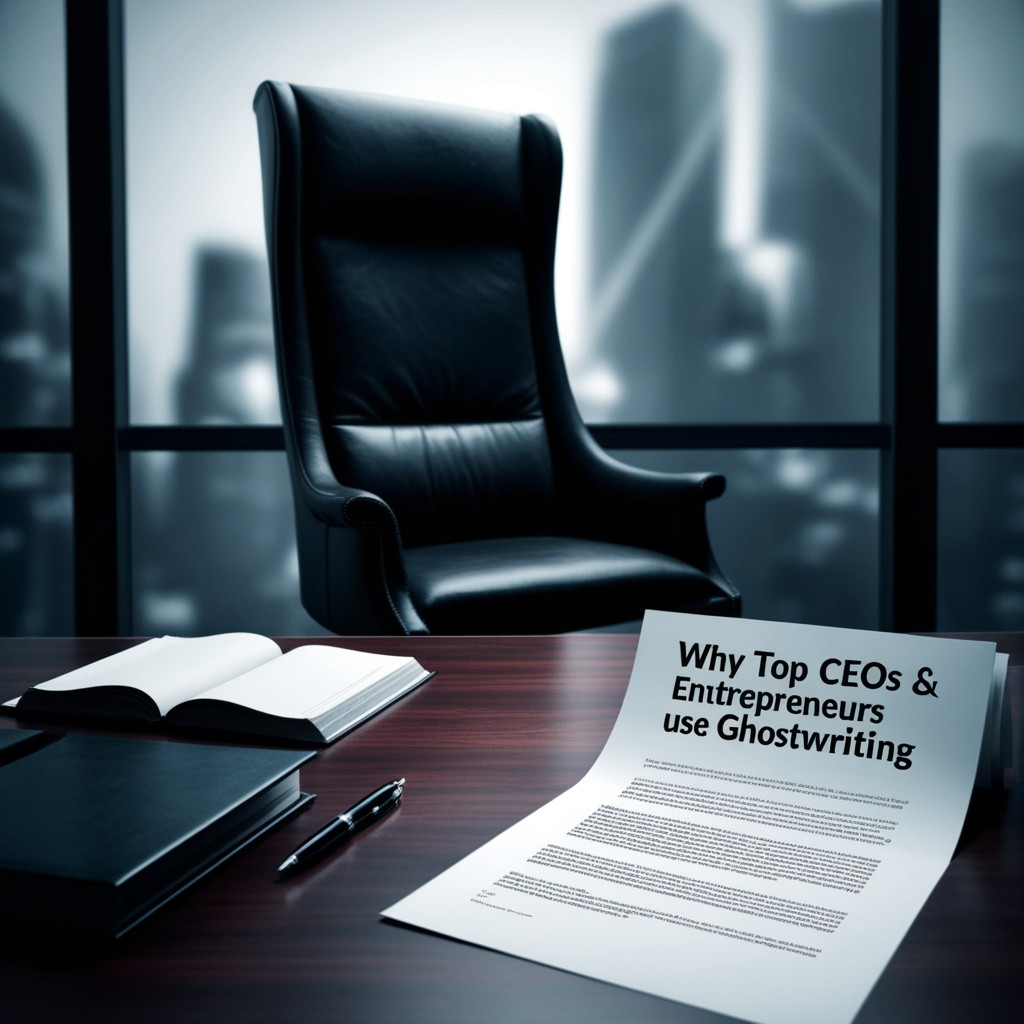Why Top CEOs & Entrepreneurs Use Ghostwriting Services (And How You Can Too)

Let’s be real.
You’ve probably noticed it: the same names showing up in Forbes, LinkedIn feeds, keynote stages, and, oh look, another best-selling book. CEOs, founders, venture-backed darlings. Thought leaders. Everywhere. All the time.
And you might be thinking, 'Do these people not sleep?'
Short answer: they do. But they also have help specifically from people like me. Or someone like me.
That’s the secret few openly acknowledge, though many rely on it: professional ghostwriting services. Especially in the U.S., where thought leadership isn’t just a PR boost, it’s practically a currency.
Thought Leadership Is the New Corporate Armor
There’s this modern expectation that if you’re a leader, you should also be a storyteller. Your ideas should be out there, polished, persuasive, and everywhere your brand needs to be.
But here’s the tension: leading a company doesn’t magically grant you time to write a LinkedIn manifesto or a personal op-ed on innovation in fintech. It just doesn’t.
And yet, ignoring the content game? Risky.
A 2024 Edelman and LinkedIn study found that 77% of decision-makers believe thought leadership is more important than ever, and more than half spend at least an hour a week engaging with it. Why? Because we trust leaders who share. We follow founders who write. And we invest in clarity of vision.
So, Why Not Just Write It Yourself?
You could try. Some do. But let me tell you a quick story.
A client of mine, a SaaS founder with a brain wired like a chess engine, attempted to write his blog posts. Smart guy. But every draft reads like a technical white paper combined with a manifesto. Dense. Brilliant. Unreadable.
He finally admitted, “I know what I want to say. I just don’t know how to say it.”
That’s where ghostwriting steps in. Not to invent your ideas but to translate them cleanly, powerfully, and in your voice.
Ghostwriting Fills the Gaps You Don’t Brag About on LinkedIn
Time is the obvious hurdle. But it’s not the only one.
There’s also the invisible stuff:
- The cognitive fatigue of context-switching from revenue reports to creative writing.
- The stress of knowing what you mean but not how to make someone care.
- The wild inconsistency when one week you write like Hemingway and the next like a TED Talk gone rogue.
A professional ghostwriting service, USA-based (or wherever you are), acts like a stealth communications partner. Not just a “writer,” but a voice shaper. A strategist. A sounding board.
They listen, conduct interviews, research, and refine their work. They help you sound like…well, the best version of you.
But Wait—Isn’t That Cheating?
Let’s squash this now: No, it’s not. Not even close.
Ghostwriting is execution, not impersonation. If the ideas are yours and the insights come from your brain and experience, there is no ethical conflict. It's a collaboration.
Think of it like this:
You wouldn’t build your website from scratch unless that is your business. You hire designers. Developers. Experts. Because you care about how you’re seen.
Writing? Same logic.
Do you want your story told well? You bring in someone who builds stories for a living.
What Top Leaders Actually Get About Professional Ghostwriting Service
Here's the nuance most people miss:
It buys time without sacrificing voice.
Delegating 10–15 hours of content creation a week frees you up for investor meetings, product strategy, or getting a good night's sleep.
The content isn’t just “good.” It’s strategic.
Ghostwriters plan. They don’t just type. They research trends, map narratives to business goals, and shape messaging that aligns with what your audience wants to hear. (Not just what you want to say.)
The voice is consistent even when you’re off-grid.
At a retreat? On a flight to Singapore? A good ghostwriter keeps the drumbeat going. Your LinkedIn posts don’t take a sabbatical when you do.
They keep your brand tight.
Whether it’s a pitch-perfect Forbes article or a “vulnerable” founder post that doesn’t make people roll their eyes, ghostwriters help you sound thoughtful without sounding… manufactured.
They protect your reputation.
Ghostwriting is built on trust. Confidentiality clauses aren’t just standard; they’re sacred. No leaks. No awkward disclosures.
So… How Do You Get in on This (The Right Way)?
First things first: know what you want.
Do you want to:
- Build industry authority?
- Write that business book that's been stewing in your head for two years.
- Share your leadership philosophy in weekly posts without ghosting your audience (pun fully intended).
Once you know the “why,” it’s easier to find the “who.”
Look for a professional ghostwriting service based in the USA (or internationally, if time zone differences don’t bother you) that specializes in executive content. You want someone who understands your industry but also your unique quirks.
And prepare to collaborate. A ghostwriter isn’t a magician. They need your voice, your anecdotes, your take on things. The best relationships feel like editorial therapy. Messy notes. Voice memos. Tangents that turn into gold.
Also? If a ghostwriter promises to “make you go viral,” run. Virality isn’t the goal. Resonance is.
Final Word: You Don’t Need to Write Alone to Be Authentic
I’ll end with this:
Thought leadership isn’t about showing off. It’s about showing up. It’s not about flexing your IQ but connecting with people who matter: customers, investors, peers, and the next generation of leaders.
Your voice is too valuable to let it sit in a Google Doc graveyard.
So yes, partner with a ghostwriter. Get that executive ghostwriting support. Hire that business book ghostwriter if you’re ready to publish. Let a professional ghostwriting service USA help you make the leap from idea to impact.
Because of your message? Deserves to be heard. Even if someone else helps you write it.